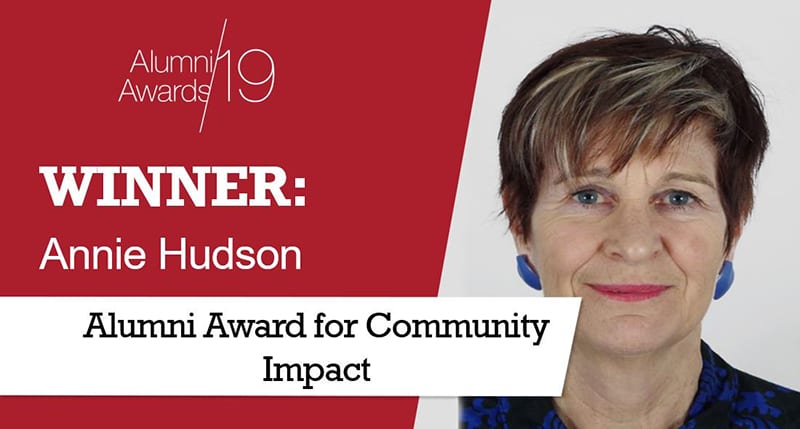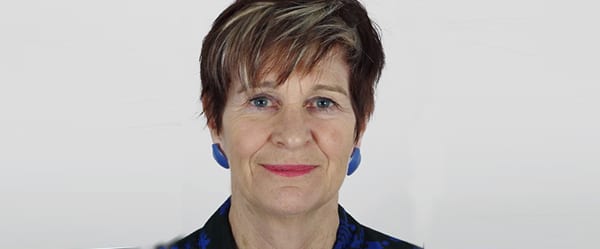Alumna Annie Hudson (BSc 1972), Director of Children’s Services, London Borough of Lambeth, tells us what she loved about studying at Bristol and why she’s honoured to have received this award.
Annie originally started studying Law at Bristol but five weeks in she realised it wasn’t for her and switched to Social Science, a decision which was instrumental in her rise to becoming one of the country’s foremost authorities on services for children. Graduating in 1972 with a BSc in Social Science, Politics and Sociology this current Bristol resident (and ex-staffer at the University) explains what drew her to Bristol and how it has informed her career and life to date.
Why Bristol?
I’m originally from London and as an undergraduate I was drawn to Bristol for several reasons, not least its reputation as a place of academic excellence. I also liked the idea of being in a city, especially one with such an aesthetically pleasing campus and with good access to the countryside. It’s the best of both worlds. It was, and remains, a very well-regarded university. Bristol gave me a solid bedrock of an education. It was here that I acquired skills in critical and analytical thinking as well as confidence in writing and communication skills. I got an excellent grounding in the social sciences. Some of the politics and sociology lectures were real highlights of my time there, pushing me to think deeply and broadly about complex social issues. We had big, challenging debates with one another and with our lecturers, pushing us to think about different ways of seeing and understanding the world we live in.
Advice to current students
Bristol has high academic standards and a great physical and social environment. One thing I would advise current students is to get out and explore all parts of the city. Looking back, I think I had quite a narrow geographical experience of the city as a student, I wasn’t fully aware of some of the social differences between different communities living in the city. It is really important to use your time here to engage actively with the city, its diverse and resourceful communities; so get out and don’t stay in a bubble. This is important in terms of making a social contribution to the city, to your future careers, and for general personal enrichment. Get as much practical experience as you can.
When you’re at Bristol your intellect is really stretched. Bristol has very high academic standards and a great physical and social environment. It’s a wonderful place to be a student.
The award
I’m so touched that David Berridge, Professor of Child and Family Welfare at the University nominated me for this award. I’ve known David from when I worked as Director of Children’s Services in Bristol from 2008 -2013 and I’ve long been an admirer of his work. I appreciate the fact that the University of Bristol works hard to promote evidence to inform social work practice. Research from Bristol was an important shaper of some of my professional decisions in in Children’s Services in Bristol and now in Lambeth. Receiving this award means a lot as it’s from my alma mater and I’m a resident of the city so I’m immensely proud to be counted amongst the winners.
Career
I was a social worker first, then an academic, before returning to social work. Studying at Bristol undoubtedly shaped and helped my career because of the intellectual skills and understanding it provided. I subsequently chose to train and work as a social worker for a range of reasons, including a natural curiosity about families and relationships I enjoy social work’s interest in working at the interface between individuals, communities and society. It can be a very challenging and demanding job; it is also one the public (and media) often misunderstands. However, the rewards are also very great when, for example, a child is helped to be safe and recover from trauma.
I’ve been a senior manager for the last 20 years; this involves being both able to operate very strategically and to stay fully in touch with the realities of practice and work with families. I’m sure that my excellent academic training at Bristol has contributed to my ability to speak across different systems to find solutions to social problems. In my area of work, one must look for answers to issues that cut across different public services. It involves being a leader across different ‘systems’, services and communities, including schools, the police, and health services. You need the ability to see the bigger picture.
My degree at Bristol made me more socially conscious. We had rigorous intellectual debates about politics and social issues facing the world. For me it was a time of discovery. I learned so much not just from my studies but also from my peers. Studying at Bristol is a great opportunity to make social networks.
Career highlights
It’s my view that social work can be terribly misunderstood and misrepresented. What we do is unbelievably difficult work and most of it is hidden from public view, except of course when things go wrong. So when we had the opportunity in Bristol to work with the BBC on a TV show to raise the profile of social work, I jumped at it. Some colleagues thought I was crazy and taking a great risk in inviting in the cameras. There were risks but I felt it really crucial that we provide a more accurate picture of social work to the general public. Protecting our Children went on to become widely acclaimed for its portrayal of social workers’ daily and direct work with children and families. I’m incredibly proud to have been part of that project.
I’m also very proud of a body of work I did in the 1980s as an academic, researching adolescent girls who were in care. This research has of course been superseded since then, but at the time it was influential and had a real impact. I believe that it made a difference to work with this group of children and young people.
Fond memories
Bristol wasn’t all about the study. I used to love walking across the suspension bridge late at night, enjoying romantic views of the city, sometimes in good company! I enjoyed my time at Bristol, so much so that I’d slowed down a bit in my second year on the studying front. I was at a Christmas party in my third year when a tutor made a comment that I’d be fine, I’d definitely get a 2.2. I was somewhat peeved by this and pulled out all the stops for the rest of my time there! I worked very hard to gain a 2.1 and it probably contributed to my work ethic since then. It is a long time since my first week as a fresher in Badock Hall. I remember being in a long line of students getting BCG injections and then, when it came to my turn I fainted in front of everyone. It was deeply embarrassing! I have better memories of enjoying myself in the Anson Rooms, especially at the great rock and folk concerts they held there, I remember being particularly enthralled by Deep Purple amongst others.
Greatest challenge
The work that I do now involves working to help and protect children, young people and families who are often facing unimaginable adversity but who also have great resilience and personal resources. Our challenge is helping to create conditions in which we can best help individual children and families have good, safe and happier lives. Searching for the best way of making a difference to individuals and communities, in the face of great austerity, is sometimes hard. But I remain optimistic and have real faith in making good change possible.



I was a fresher in Badock Hall 1969-1970 too. I read Economics with Statistics.